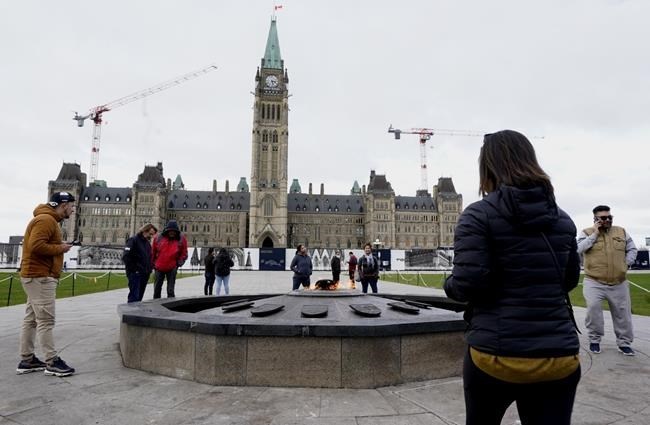OTTAWA — The federal government dismantled Friday a Parliament Hill memorial for Indigenous children who never returned from residential schools.
The memorial — hundreds of pairs of children's shoes, stuffed toys, messages and other items — sprang up spontaneously around the Centennial Flame last spring after the discovery of what are believed to be the remains of children in unmarked graves at several former residential school sites.
A spokesperson for Crown-Indigenous Relations and Northern Affairs Canada said many of the items were in an "advanced state of degradation."
Megan MacLean said the department consulted with national Indigenous groups and the Tk’emlups te Secwepemc and Cowessess First Nations, where ground-penetrating radar revealed hundreds of unmarked graves, about the protocol to be followed for removing the memorial.
They advised that the removal should be directed by the Algonquin Anishinabeg First Nation on whose traditional territory Parliament Hill sits.
"Working with the grand chief of the Algonquin Anishinabeg First Nation and with community elders it was decided that the items would be removed on Oct. 22, 2021, following protocol and under the guidance of elders," MacLean said in a statement.
"Sacred items being removed will be entrusted to the elders. For the other items, depending on the degree of degradation, items will be either identified for donation, kept for educational purposes, recycled or disposed of in accordance with City of Ottawa guidelines."
The government will work with Algonquin elders and leadership to determine where to donate appropriate items. For now, MacLean said everything is being "safely stored."
She added that the government "remains committed to working with survivors, elders and other Indigenous partners, families and survivors to ensure that the steps taken are culturally sensitive."
As caretakers of the land, the Algonquin Anishinabeg had a duty to remove the deteriorating gifts left on Parliament Hill, which had been soaked by recent rainfall, said Savanna McGregor, acting grand chief of the nation's tribal council.
“We’re going to be doing a sacred fire with them at a future date once the items start to dry,” she said in an interview.
McGregor said some Algonquin elders and grandmothers were present while the memorial was being packed up, making sure it was done in a respectful way in accordance with Algonquin tradition and on behalf of “other brother and sister communities.”
They objects were blessed in a ceremony before the memorial was dismantled, she added.
“They’re not just items and they represent everything — the trauma, and the hope and all of the emotions that come with the Indian residential school experience for our peoples,” she said.
“It was very intense and we’re lucky to have a little one from our community … with us. He totally helped to kind of guide and change the energy from total sadness to a lightness and some hope.”
The Inuit Tapiriit Kanatami said it supports "efforts to protect the shoes and other items contributed by Canadians from deterioration, to identify an appropriate space to display some of these pieces in a respectful way, and to develop plans for a permanent memorial."
This report by The Canadian Press was first published Oct. 22, 2021.
Stephanie Taylor, Laura Osman and Joan Bryden, The Canadian Press




